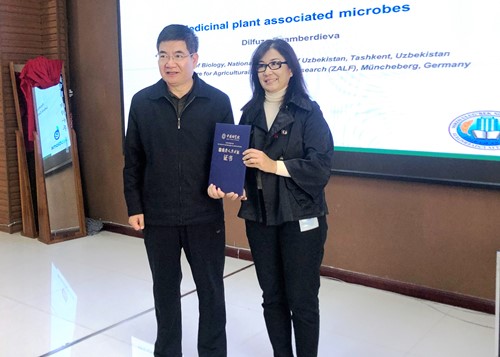Successful scientific cooperation based on friendship and mutual trust
Dilfuza Egamberdieva
My research interests include microbial ecology, plant-microbe interactions, and the impact of management practices on soil biological and chemical properties. Moreover, I am interested in medicinal plant research, especially natural active compounds that exhibit a wide range of pharmacologically essential properties. Our scientific collaboration in the ecology and molecular biology of plant microbiomes with several foreign countries has led to a deeper understanding of plant-microbe interactions.

My cooperation with the research group of Dr. Li Li and Prof. Li Wenjun from the Xinjiang Institute of Ecology and Geography (XIEG), Chinese Academy of Sciences (CAS), began in 2014. Professor Li Wenjun's group focused on the classification, nomenclature and identification of microbial diversity in various ecosystems including soil, plants, lakes and hot springs. The CAS President's International Fellowship Initiative (PIFI) in 2019 has provided me with an excellent opportunity to discover the progress achieved by China using advanced technological tools in molecular biology, and to deepen this cooperation. I lived in Urumqi city and joined the research team in the Key Laboratory of Biogeography and Bioresource in Arid Land, Xinjiang Institute of Ecology and Geography, CAS.
My contribution focused on medicinal plant-associated microbes from Xinjiang and Uzbekistan and their metabolites, which resulted in several joint publications. The Chinese laboratory has advanced equipment for metagenomic and metabolite analyses and it was an excellent place to conduct advanced research in the field of microbial ecology and physiology. We have described the diversity of microbes associated with medicinally important plants collected from Xinjiang and Uzbekistan mountain areas and found unique novel bacterial species. I had the opportunity to have interactions with students and other scientists and held several seminars on related research topics.
My visit not only contributed to the research, but has been expanded further by the establishment a JointUzbek-China Key Lab of Ecosystems and Biomes of arid lands at the National University of Uzbekistan. I believe this key laboratory will strengthen our scientific cooperation in the field of the improvement of soil and plant health under climate change for the benefit of mankind. It will also serve as a bridge in promoting collaboration between Chinese and Uzbekistan scientific institutions and individuals on joint research and technology exchanges.
During my visit, I attended an International Conference on Silk-road Disaster Risk Reduction and Sustainable Development from May 11 to 12, 2019 in Beijing, and delivered a talk on the ecological aspects of the Aral Sea basin. Moreover, I was involved in organizing the first Sino-Uzbekistan Symposium on Bilateral Cooperation Initiative: Ecology, Environment and Regional Sustainable Development from October 11 to 15, 2019 in Urumqi, China. About 30 scientists from the National University of Uzbekistan visited the Xinjiang Institute of Ecology and Geography in June 2019.
During my tenure as a PIFI Professor I have not only gained knowledge but also made professional contacts, enjoyed the Chinese culture, foods and visited historical places. The city of Urumqi where I lived was a good place for me to integrate into society faster. This is because I understand the Uyghur language and was able to go to the shops, banks and other places easily and manage my personal needs. Moreover, I found the food and customs similar to my own country.
In conclusion, I would say that the PIFI Fellowship gave me a great opportunity to establish a strong network with Chinese scientists and to make more friends. Friendship, respect, and honesty are the bases for successful cooperation. I am very thankful to the Director of Xinxiang Institute of Ecology and Geography Dr. Zhang Yuanming for his generous support, and to my friend Qiao Jianfang from the International Department, with whom I enjoyed coffee breaks. My hosts, Dr. Li Li, whom I met in Finland in 2009 and became close friends with, and Prof. Li Wenjun, who was very kind and professionally supportive, helped me to perform fruitful research and to establish a long-lasting cooperation with Chinese institutes. I am also grateful to my other Chinese colleagues and international students who made my life remarkable and meaningful. I very much look forward to continuing collaborating with the XIEG, CAS through the joint Uzbek China Key Lab and I hope we can expand our cooperation with other countries.
- Appendix
-



